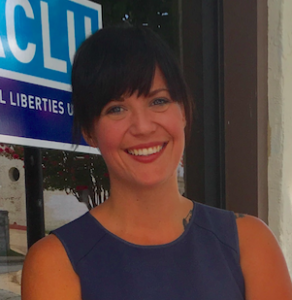By Allie Shinn:
It’s a formula we know well. When an Arab or a Muslim commits a violent crime, the script kicks in. Almost immediately, the story becomes about Muslim extremism. It’s a matter of time before someone mentions ISIS. Local law enforcement field questions on homegrown terrorism while years of American foreign policy are called under attack. In essence, when a Muslim or an Arab-American commits a crime, the narrative is all too predictable. This is true even when all evidence indicates the perpetrator acted alone and outside of any religious or race-based motivations. Indeed, evidence becomes irrelevant. We wrap the incident in the same, tired rhetoric and label it terrorism.
This narrative is sickening and at every turn it exposes itself as a ruse. We should be smarter than this. We should be more interested in the truth. The victims deserve it and the American promise of equality demands it.
The flipside of this broken narrative has its own predictable and troubling themes. Last month, in Tulsa, Khalid Jabara was murdered by his neighbor. The attacker, Vernon Majors, routinely harassed and threatened the Jabara family based upon their ethnicity and their perceived religion. Majors went so far as to violently attack Haifa Jabara, Khalid’s mother, by running her over with his car. Shortly after being released from jail on bond, Majors shot and killed Khalid outside of his home.
Largely, news outlets have correctly reported the facts of this horrific incident, including the perpetrator’s history of hate motivated threats and acts of violence. Yet, as of today, no one has insinuated that this attack might be tied to anything larger than the incident itself. No major news source has attempted to tie this man to a terrorist organization. No one has suggested that a foreign entity, to which the accused has no evidenced connection, might soon claim responsibility for the attack. There have been no calls for prominent white men to condemn Majors, nor have white men across the country been required to prove their own allegiance to America. We have not been told that perhaps it is our freedoms, our values, and our very way of life that are under attack.
There’s a formula for these sort of attacks as well. News outlets have already begun to report on Majors’ mental illness. While Majors may very well may be suffering from a serious mental illness, the media’s propensity for defaulting to this narrative when an attacker is white detracts from the pervasive and deadly racism that permeates nearly every aspect of our society. Mentally ill or not, we must discuss Majors’ motivations, including the persistent presence of prejudice that has and continues to stain the American fabric. It seems clear that the murder of Khalid Jabara was fueled by his ethnicity and for his perceived religious affiliation.
Of course we should not begin to subject white men to the same scrutiny with which we treat Arabs and Muslims. Throwing more ignorance on the roaring fire of American hatred will not lead us to the kind of society we aspire to. This incident, however, is the most recent of countless examples that paint a stark contrast between our treatment of white Americans and our treatment of non-white Americans. If a society is only as free as its least free member, then so much work remains.
We must halt this knee jerk trend of labeling Muslim and Arab criminals as terrorists. In doing so, we do a disservice to the victims, to their suffering families, and to our sense of justice and equality in this nation.
Likewise, we must begin to discuss the nationwide atmosphere of racism that fosters and harbors white supremacists. We have systemic questions to answer and so much reconciling to do. We must continue to work to ensure that we address these difficult questions in the sincere hope that if we allow these conversations to happen in the most honest way possible we can begin to inch closer to the promise of equality extended to each person who calls this nation home.
We mourn for Khalid Jabara, for the family he left too soon, and for all those who have lost loved ones to violence. We offer as consolation our commitment to ceaselessly fight for an America in which senseless acts of violence, predicated on our history of racism, xenophobia, and intolerance, are taken seriously, happen as little as humanly possible and, maybe someday, do not happen at all.
Allie Shinn is the Director of Philanthropy
and Strategic Initiatives at the ACLU of Oklahoma. She holds a Bachelor of Arts and a Master of Science both from Oklahoma State University.


